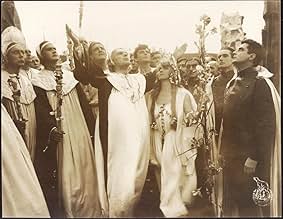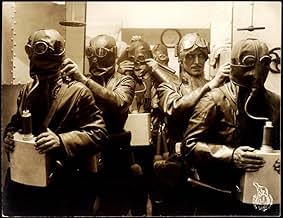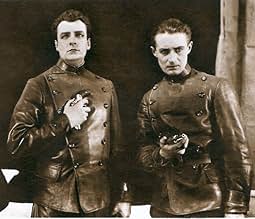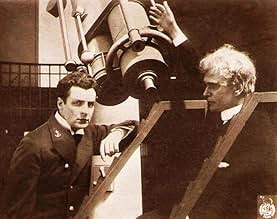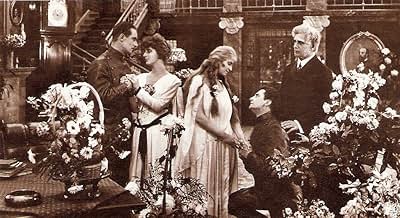A group of researchers from Earth travel in a spaceship to Mars, where, to big surprise, they find a peaceful vegetarian and pacifist civilization.A group of researchers from Earth travel in a spaceship to Mars, where, to big surprise, they find a peaceful vegetarian and pacifist civilization.A group of researchers from Earth travel in a spaceship to Mars, where, to big surprise, they find a peaceful vegetarian and pacifist civilization.
Nils Asther
- Wounded Martian Citizen
- (uncredited)
Alfred Osmund
- Martian Priest
- (uncredited)
Featured reviews
Sci-fi is a rapidly changing genre. It loses impact even more rapidly than horror. Therefore it's virtually impossible to see a sci-fi movie from the past (from the pre-space period, i.e. late 50s) that isn't laughable in some sense. First serious sci-fi epics appeared in the very early 50s, and bearing in mind the first space yarn was filmed by Melies in 1902, we get about 50 years of sci-fi without the very basic concepts of space travel. Where The Trip To The Moon can be dismissed as a funny experiment, The Trip To Mars cannot. This is a serious film. The makers didn't know about weightlessness or the absence of atmosphere in space, plus about a hundred more things we know today. That was the period, when everybody was raving about the channels on Mars, so they naturally assumed there was intelligent life on that planet. Melies shows frogmen and other strange creatures on the Moon; in 1924 there appears the still popular tinfoil dress for Martians in Russian film Aelita. So, in between, we get the Egypto-Greek fairy-tale world of this film: wise old priests being wise; and virgins prancing around, praising virtue in the world, where virtue obviously is as normal and unnoticeable as metabolism. Enter the Earthlings, introducing death and sin. Well, nothing spectacular follows: they soon are "cured" and learn the ways of the righteous. This film is a total orgy of enjoyment. The double feature released by the Danish Film Institute (together with a disaster film from 1916, The End Of The World) boosts their usual superior quality. The Danes began storing and archiving their films very early, so you get a very clean second generation copy from a period when most of US films withdrawn from circulation went to the glue or comb factory. It's a pity this film with so many different locations isn't color tinted. The rather uninspired piano accompaniment, another trade mark of the series from the DFI, tends to grow a bit tedious too. But nevertheless, a remarkable film and something you can show to your friends without being afraid that they'll think you're a weirdo.
I saw this film from 1918 recently at our local Helsinkian film archive. It seems that the Danish Film Institute has reconstructed it in 2006 to celebrate the 100th anniversary of Nordisk filmcompany, which was one of the largest in the world in the early 20th century. I believe there are several copies with English translations circulating around Europe at the moment.
I found the film fascinating and the trip to Mars well thought out. The plot line is certainly original, but I really don't want to reveal any more of it at the moment, as now the danger of spoiling things for you really exists ;-).
The film is also available on DVD, query the Danish Film Institute (Det Danske Filminstitut) web pages at dfi.dk with 'Himmelskibet' to get more info.
I found the film fascinating and the trip to Mars well thought out. The plot line is certainly original, but I really don't want to reveal any more of it at the moment, as now the danger of spoiling things for you really exists ;-).
The film is also available on DVD, query the Danish Film Institute (Det Danske Filminstitut) web pages at dfi.dk with 'Himmelskibet' to get more info.
I don't know of any other full length science fiction film that was made before The Trip to Mars. So in that sense it's the first. I watched other silent sci-fi films from the beginning of the 20th century but all of them were no longer than 15 minutes, and this one was the first of that era that I took seriously.
It held my attention through the movie and it has some very nice and moving scenes. Despite being silent the makers managed to pack it with an interesting and engaging plot, good actors play, science fiction, drama, adventure and a love story. It has an amazing well-built spaceship and special effects are fairly good for the time. The film has very strong religious and Christianity-rooted undertones with a message of hope for humanity plagued with murder, hatred and deceit. Another surprise was that the film was nothing like many other sci-fi movies, most of which came out of Hollywood - just clichés that were about either aliens being vicious monsters, or some oversexed alien women, or an imbecile earth superhero. This one does offer the viewer a chance to engage his brain and heart which is probably more important that the above mentioned infantile and unintelligent consumer rubbish.
So it was quite an unexpected surprise to see such an old and yet very good film and I very much recommend it to any lover of science fiction who can be interested in the oldies just as much as the modern cinema and likes to get something out of film.
It held my attention through the movie and it has some very nice and moving scenes. Despite being silent the makers managed to pack it with an interesting and engaging plot, good actors play, science fiction, drama, adventure and a love story. It has an amazing well-built spaceship and special effects are fairly good for the time. The film has very strong religious and Christianity-rooted undertones with a message of hope for humanity plagued with murder, hatred and deceit. Another surprise was that the film was nothing like many other sci-fi movies, most of which came out of Hollywood - just clichés that were about either aliens being vicious monsters, or some oversexed alien women, or an imbecile earth superhero. This one does offer the viewer a chance to engage his brain and heart which is probably more important that the above mentioned infantile and unintelligent consumer rubbish.
So it was quite an unexpected surprise to see such an old and yet very good film and I very much recommend it to any lover of science fiction who can be interested in the oldies just as much as the modern cinema and likes to get something out of film.
The view of the world in this movie is clearly dated, but as the movie is from 1918, it's hard to put it against it. What is more impressive is everything it does right. This is not a movie using science fiction as a gimmick - it uses the genre to explore ideas about the time it was made. In the end of the first world war, here's a movie exploring if mankind can live in peace, how we treat our prisoners, how life in a submarine (here: spacecraft) can affect ones mental health, how pushing science forward is a global affair, and can unite different parts of the world, and so on.
While I am not sure just how much the general public knew about astronomy - this movie presents the mission to mars in a way that seems realistic. It takes time, people doubt it, and it takes a toll on the members. They point out where mars will be as they leave Earth, and where it will be when they arrive. The spacecraft itself is like a submarine with a propeller and wings. Mars itself I am sure was quite a mystery back then, so the fact that they made it Earth-like is very understandable. It also opened up for them using Mars and Martians in a way that let the film makers comment on the people of Earth.
The movie is not subtle in the message it is conveying: people on earth should stop with wars and violence and rather go with love. In the end of the most gruesome war in world history up till that point - that sounds like a good message.
The worst part about this movie is the one evil character in it. He serves little purpose, and undermines the underlying message of the film that humans are capable of being good.
While I am not sure just how much the general public knew about astronomy - this movie presents the mission to mars in a way that seems realistic. It takes time, people doubt it, and it takes a toll on the members. They point out where mars will be as they leave Earth, and where it will be when they arrive. The spacecraft itself is like a submarine with a propeller and wings. Mars itself I am sure was quite a mystery back then, so the fact that they made it Earth-like is very understandable. It also opened up for them using Mars and Martians in a way that let the film makers comment on the people of Earth.
The movie is not subtle in the message it is conveying: people on earth should stop with wars and violence and rather go with love. In the end of the most gruesome war in world history up till that point - that sounds like a good message.
The worst part about this movie is the one evil character in it. He serves little purpose, and undermines the underlying message of the film that humans are capable of being good.
The early first days of the last century were times of great human curiosity about new technologies and the marvellous possibilities in the world of science; startling discoveries and new inventions set the world on the path to modernity. Unfortunately, this time of enlightenment also coincided with terrible conflicts and war, mankind at its worst.
That human duality is very well reflected in the Danish film "Himmelskibet" (1918), directed by the great director Herr Holger-Madsen. It is a sci-fi film that includes a clear and sincere pacifist claim.
The film tells of the eagerness and hardships of the sea captain Herr Avanti Planetaros, now reconverted into a space captain, and his project of a trip to Mars. Before embarking on his particular space odyssey, Captain Planetaros will have to bear the incredulity and the scorn of many conservative astronomers, especially Professor Dubius ( ah, what a proper name ) . In spite of such indifference and after many troubles and years of work, the spaceship "Excelsior" is finally constructed and Captain Planetaro's trip to Mars goes from dream to reality. Once on Mars, Captain Planetaros and his crew finds an advanced society in which peace is a way of life among its citizens.
Filmed during the terrible years of WWI, "Himmelskibet" was obviously influenced by that devastating conflict that destroyed Europe during four miserable years. The message of peace and morality comes from the archaic but advanced Martian society which hopes to influence the Terrestrial civilization and wean it from such bad habits as violence, wine and canned meat.
So, Martians will show Terrestrials the way to achieve a better society on Earth with pacifist messages reminiscent of those of religion and pious morality, and in stark contrast to the bad behaviour on earth which has wrought so much unhappiness through the centuries. The Martians hope their philosophy will be spread on Earth once Planetaros and his crew returns home.
In these modern times in which the movies are full of technological magic, the special effects in "Himmelskibet" are primitive by comparison but are still full of naive charm. In fairness, longhaired and modernen youngsters should remember that Herr Holger-Madsen was also a very modernen youngster in those olden times, a director who was innovative, imaginative and influential.
It must be said too that this Herr Graf thought that instead of journeying through space to Mars, Captain Planetaros may have travelled back in time to ancient Greece since the Martian citizens wear white and classical robes so reminiscent of the Hellene imaginarium ( Martians may look like Greeks but in comparison they are crashing bores ). However, in spite of its naive ways, the film effectively conveys its important message and one that is no less valid today where mankind still dreams of a world of peace and cooperation. Alas, even after Captain Planetaros' trip to Mars, the world seems not to have grown in wisdom.
And now, if you'll allow me, I must temporarily take my leave because this German Count must make love to one of his Teutonic heiress and war with the other one.
That human duality is very well reflected in the Danish film "Himmelskibet" (1918), directed by the great director Herr Holger-Madsen. It is a sci-fi film that includes a clear and sincere pacifist claim.
The film tells of the eagerness and hardships of the sea captain Herr Avanti Planetaros, now reconverted into a space captain, and his project of a trip to Mars. Before embarking on his particular space odyssey, Captain Planetaros will have to bear the incredulity and the scorn of many conservative astronomers, especially Professor Dubius ( ah, what a proper name ) . In spite of such indifference and after many troubles and years of work, the spaceship "Excelsior" is finally constructed and Captain Planetaro's trip to Mars goes from dream to reality. Once on Mars, Captain Planetaros and his crew finds an advanced society in which peace is a way of life among its citizens.
Filmed during the terrible years of WWI, "Himmelskibet" was obviously influenced by that devastating conflict that destroyed Europe during four miserable years. The message of peace and morality comes from the archaic but advanced Martian society which hopes to influence the Terrestrial civilization and wean it from such bad habits as violence, wine and canned meat.
So, Martians will show Terrestrials the way to achieve a better society on Earth with pacifist messages reminiscent of those of religion and pious morality, and in stark contrast to the bad behaviour on earth which has wrought so much unhappiness through the centuries. The Martians hope their philosophy will be spread on Earth once Planetaros and his crew returns home.
In these modern times in which the movies are full of technological magic, the special effects in "Himmelskibet" are primitive by comparison but are still full of naive charm. In fairness, longhaired and modernen youngsters should remember that Herr Holger-Madsen was also a very modernen youngster in those olden times, a director who was innovative, imaginative and influential.
It must be said too that this Herr Graf thought that instead of journeying through space to Mars, Captain Planetaros may have travelled back in time to ancient Greece since the Martian citizens wear white and classical robes so reminiscent of the Hellene imaginarium ( Martians may look like Greeks but in comparison they are crashing bores ). However, in spite of its naive ways, the film effectively conveys its important message and one that is no less valid today where mankind still dreams of a world of peace and cooperation. Alas, even after Captain Planetaros' trip to Mars, the world seems not to have grown in wisdom.
And now, if you'll allow me, I must temporarily take my leave because this German Count must make love to one of his Teutonic heiress and war with the other one.
Did you know
- TriviaReported by the British press in 1919 to have cost £20,000. After inflation this would be approaching £1.5 million in 2024.
- Quotes
Avanti Planetaros - Captain of the Space Ship: Glowing and calling planets... I am coming!
Details
- Release date
- Country of origin
- Official site
- Language
- Also known as
- Nebeska ladja
- Production company
- See more company credits at IMDbPro
- Runtime
- 1h 37m(97 min)
- Color
- Sound mix
- Aspect ratio
- 1.33 : 1
Contribute to this page
Suggest an edit or add missing content


